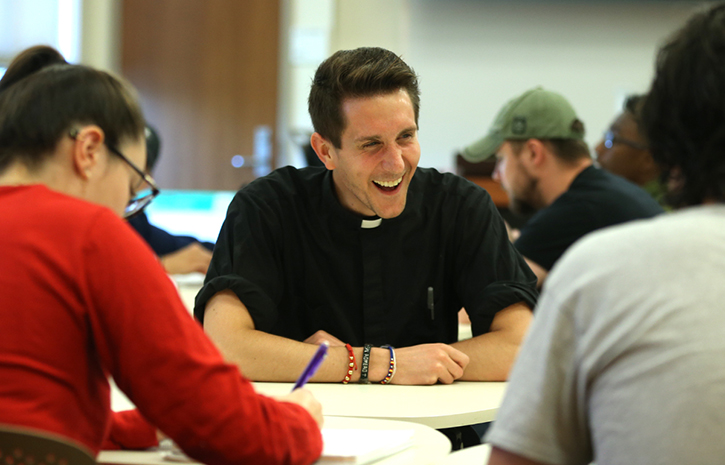
David Inczauskis, S.J., reflects on his first year as a Jesuit regent teaching Spanish and Philosophy
Oct 23, 2020
The COVID-19 pandemic has left an indelible mark on my Xavier experience, but I’m not so certain that this mark is altogether negative. As a first-year teacher and Jesuit regent (regency being that stage in Jesuit formation when we work full time for a few years between studies of philosophy and theology), the 2019-2020 school year began with joys and hopes, griefs and anxieties. This Chicago boy was moving to Cincinnati, to a place he had never been before the job interview. I didn’t know anybody, let alone the men with whom I’d be living at the Cincinnati Jesuit Community on Victory Parkway.
However, this sense of the unknown fed my exhilaration. I’m a scholar and teacher of Spanish and philosophy, and we might say that it’s precisely my eagerness to explore new places and meet new people, to think new thoughts and read new books, that led me into these fields of inquiry. Xavier was to be the fresh arena in which I could continue to inquire and cultivate my love of learning with students and colleagues.
Meeting new people is an ever-fresh source of joy in my life, and I quickly met people at Xavier who would mark the trajectory of my first few semesters. Sean L. Rhiney, the Director of the Eigel Center for Community-Engaged Learning, and Diane Ceo-DiFrancesco, Faculty Director of the Eigel Center and fellow Spanish colleague, suggested the Academy of Community-Engaged Faculty, which was to take place in the spring semester. I enrolled and began working with Diane to develop a Spanish course that would involve the Hispanic community in Cincinnati. We settled on a partnership with Su Casa, the Hispanic wing of Catholic Charities of Southwest Ohio. My students and I would tutor Hispanic children while learning about their broader educational assets and needs. The plans were laid for a pilot class in Fall 2020.
Then came the pandemic and questions about the feasibility of the project. Diane, ever creative, was unphased. We developed a virtual solution. The students would tutor, but they would tutor virtually. After all, now more than ever, schoolchildren need support for their learning, and their parents need a break. Su Casa was amenable to this virtual proposal, so my twenty Spanish students and I are currently tutoring about thirty migrant children, most of whom attend Cincinnati Public Schools. Meanwhile, experts on migration and education join our class virtually to discuss the deeper socioeconomic issues that give rise to the current conditions of migrants in Cincinnati. Our class addresses both the immediate, personal context and the systemic, social context of the children we encounter.
Though our class is responding to a key need of the Hispanic community in Cincinnati, the relationship is far from unilateral. While we are teaching the children English and math, they are teaching us Spanish. In fact, we encourage the tutors to conduct the math portion of the session in Spanish so that both the Xavier and elementary school students can continue to foster their bilingual skills. I’m incredibly grateful to the Eigel Center and to Catholic Charities for making this unique educational experience possible.
Father Ignacio Ellacuría, Jesuit martyr and former president of the Central American University in El Salvador, has written that a university has three interconnected purposes: teaching, research, and social projection. By interconnected, he meant that teaching and research should be for the sake of the community. We learn precisely so that we can better serve and construct a society of justice and peace. That’s why we affirm that a Jesuit education should form people who are “for and with others.” I’m grateful that, even in the throes of a global pandemic, we at Xavier can continue to work for that kind of formation for our students and faculty on campus and for that kind of community off campus.
Written by David Inczauskis, S.J.